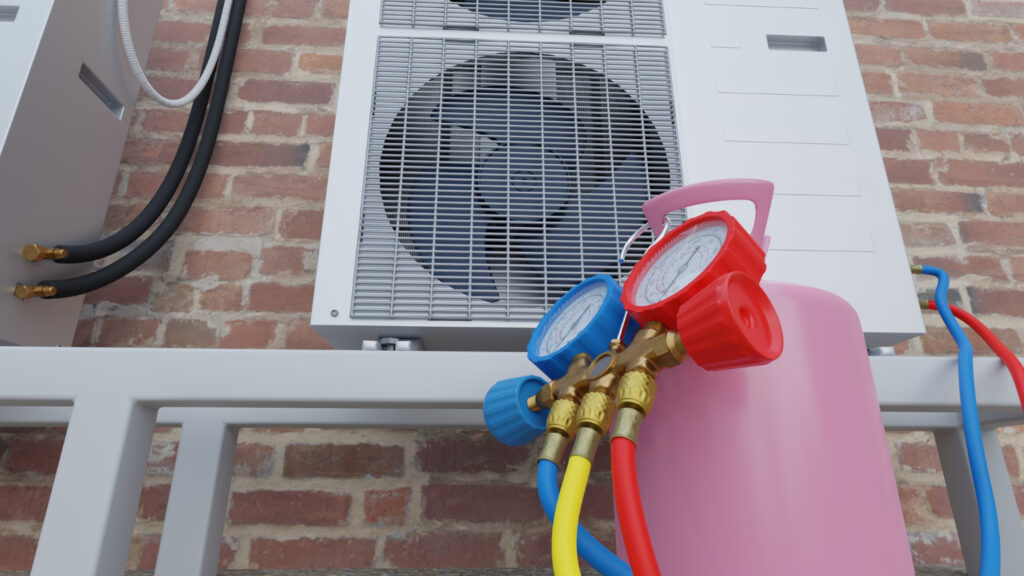Keeping your heat pump in good shape is key to staying comfortable through the seasons in St. Louis Park. When it stops heating and cooling the way it should, it often points to a problem hiding below the surface. One common issue is low refrigerant. While refrigerant doesn’t get used up like fuel, it can leak over time due to worn components or small cracks in the lines. If that happens, your heat pump starts losing efficiency and struggles to keep your home at the right temperature.
Since refrigerant is vital to how a heat pump works, changes in comfort or performance are worth paying attention to. You might notice small problems at first, like rooms that don’t stay as warm or cool or higher electric bills. But left alone, the problem can get worse, and what might have been a simple fix could turn into a major repair. Knowing the early warning signs of low refrigerant can help you avoid headaches and protect your heating and cooling system.
Decreased Heating And Cooling Efficiency
When your heat pump is running with low refrigerant, one of the first things you might notice is that it is just not keeping you comfortable. It may be running longer than usual or still not reaching your set temperature. This often goes hand-in-hand with higher energy bills, even though your actual usage has stayed about the same.
A loss of refrigerant affects your system’s ability to move heat properly. That means in the summer, it will not cool the air as well, and in the winter, it will not heat it up efficiently. If you live in St. Louis Park and suddenly feel a difference in your home’s comfort, pay attention to these signs:
– Certain rooms staying warmer or cooler than others, even with the system running
– The system running longer than usual but not keeping up with your settings
– A sharp or steady rise in your monthly energy bill without a clear cause
– The air coming from the vents feels weaker or not as warm or cool as it used to
These issues often come on slowly, which makes them easy to miss at first. But over time, they can start affecting your daily routine. For example, one homeowner in St. Louis Park noticed their living room was always colder during the evening. Their heat pump ended up running all night to make up for the drop in refrigerant. That extra strain shortened the system’s lifespan and led to more frequent repairs.
If your heat pump is not performing like it used to, paying attention to these early signs can help you catch refrigerant loss before it turns into a larger issue.
Ice Formation On The Heat Pump
Another major sign of refrigerant issues is ice forming on the outdoor unit. It might seem strange to see ice during warmer months, but it is a real red flag. Low refrigerant causes the coils to drop in temperature more than they should. This creates excess condensation on the unit, which ends up freezing.
This kind of ice buildup may start small, with just some frost on the coils or along the refrigerant lines. But it does not take long before the frost turns into thick ice that can completely cover parts of the unit. That ice blocks airflow and puts extra pressure on the compressor, which is one of the most expensive parts to replace.
Some of the things you can look for include:
– Visible ice or frost around the outdoor unit, even during the day
– Water pooling on the ground under the unit as the ice melts
– Decreased airflow inside, even if the system seems to be running
– Loud humming or buzzing from the unit as it struggles to operate
In many cases, homeowners try to run the system as usual, hoping the problem resolves on its own. Unfortunately, the longer the system runs with frozen parts, the more likely it is to suffer long-term mechanical damage. If you are in St. Louis Park and you see ice on your heat pump, it is a clear sign the system needs attention before more issues develop.
Unusual Noises From The Heat Pump
Strange sounds coming from your heat pump can mean many things, but some noises directly point to low refrigerant. If you hear a hissing or bubbling sound, that is often refrigerant escaping from a small leak in the lines. These sounds may be faint at first and hard to hear unless you are standing near the outdoor unit, but they are important warning signs.
A hissing sound usually suggests the refrigerant is escaping through a pinhole-sized opening in a hose or coil. Bubbling can mean air is getting into the refrigerant line, which happens when pressure between the indoor and outdoor units is unbalanced. Both sounds mean the refrigerant level is dropping, which can lead to major system problems if left alone.
These noises should not be ignored:
– Hissing or bubbling from the outdoor unit or refrigerant lines
– Gurgling or rattling while the system is running
– Regular clicking that happens more often than normal start-up sounds
– A loud whooshing sound every time the unit turns on
If you live in St. Louis Park and start hearing anything out of the ordinary coming from your heat pump, it is important to act quickly. Ignoring these sounds can lead to more severe damage, including burnout of the compressor or failure of other system parts. Getting our professionals to inspect the unit early can help avoid those costly fixes.
Heat Pump Running Constantly Without Reaching the Set Temperature
If your heat pump never seems to turn off, even when temperatures are mild, that is another sign the system’s refrigerant might be low. Since heat pumps operate by transferring heat rather than creating it, they depend heavily on consistent refrigerant levels to do their job. When those levels drop, the system must work overtime to achieve the temperature you have set on the thermostat.
Over time, this non-stop cycle does more than waste energy. It causes extra wear on the fan motor, compressor, and other moving parts. That means shorter equipment life and a higher chance of breakdowns when you least expect them. In many cases, residential systems designed to run occasionally during the day end up staying on all day and night, which puts them under pressure they are not built to handle.
Signs your system may be running more than it should:
– It never seems to shut off, even on mild days
– Your home still feels uncomfortable despite constant runtime
– You hear the outdoor unit turning on multiple times overnight
– The thermostat stays in heating or cooling mode for hours
A constantly running system can also mislead homeowners who assume their unit is simply working extra hard due to outdoor conditions. But if outdoor temperatures are mild and this keeps happening, it is worth getting checked by our technicians in St. Louis Park. It is likely working too hard for a reason, and refrigerant might be at the core of the issue.
Ensuring Optimal Heat Pump Performance in St. Louis Park
Waiting too long to fix a refrigerant issue can cause bigger problems than just discomfort. Low refrigerant affects every part of how a heat pump works: heating, cooling, airflow, and energy use. It also increases strain on mechanical parts, so repairs down the road can be more expensive and more frequent. If you notice any of the signs above, it is best to stop using the system and let our professionals investigate.
Early detection can make a big difference. Catching signs like ice buildup, strange noises, or constant running gives you a chance to fix the problem before it spreads to other parts of your system. Whether your heat pump has a small leak or a bigger performance issue, our licensed technicians have the tools to analyze the refrigerant level and find the source.
If you are a homeowner in St. Louis Park, making sure your heat pump is running as efficiently as possible is not just about comfort. It is about keeping your HVAC investment running longer with fewer repairs. When you notice signs that could point to a refrigerant problem, it is a good time to bring a trusted team in to inspect and service the system properly.
If your heat pump shows signs of low refrigerant such as uneven temperatures or unusual sounds, it might be time to have a closer look at your system. At Stafford Home Service Inc, our professionals understand how small issues can quickly become major problems if not addressed. Working with an electrician in St. Louis Park can help you detect and resolve potential concerns early, keeping your home comfortable and your equipment protected long term. For a quick estimate or to book a service visit, please contact us today.



